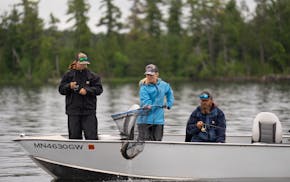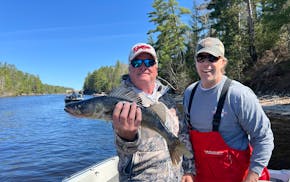The latest surprise from the Legislature, which is full of them, is that bills have been introduced to give the state-owned portion of Upper Red Lake and a 1-mile buffer of state-owned land surrounding it to the Red Lake Band of Chippewa. For good measure, the proposals also would award the band the 84,000-acre Red Lake State Forest, which abuts the southeast corner of Upper Red Lake.
The DFL-controlled Legislature might or might not have the votes to pull this off, but you have to concede these politicians have chutzpah. "I should never have had to carry this bill,'' said DFL Rep. Sydney Jordan, whose Minneapolis district lies some 265 miles from Upper Red Lake. "This is overdue. It's necessary.''
Well, maybe, and maybe not.
But five will get you 10 that Jordan is not an expert on the 1889 treaty and surveying that gave Minnesota control of 40% of Upper Red Lake, one of the state's premier walleye fisheries.
The same bet says that few, if any, of her legislative colleagues are a treaty expert, either.
Indeed, if anything is to be learned from resolutions of similar matters, it's that juries, judges and justices, not politicians or policymakers, should be the ones whose thumbs are on the scales of justice.
Either that or it's Katie bar the door, and whoever is in power at a given moment does whatever he or she wants — such as bequeathing to the White Earth Band of Chippewa the 160,000-acre White Earth State Forest, which also is being proposed this session, and for good measure tossing in Tamarac National Wildlife Refuge, which the federal government is considering awarding to the same tribe.
It's useful here to recall the approximately 10-year legal marathon that preceded the 1999 U.S. Supreme Court decision in Minnesota vs. the Mille Lacs Band of Chippewa, which was decided 5-4 in favor of the band, a decision that was vigorously supported by the court's majority while equally vigorously opposed by its minority, led by Chief Justice William Rehnquist.
Point being, most Native American treaty issues, rife as they are with disputed facts, recollections and, yes, opinions, are inherently complex. Which is why they deserve careful and studied resolution by courts of law, not legislators' whims.
The Mille Lacs case arose from a lawsuit the Mille Lacs Band filed in 1990 against the state, alleging the band had reserved in an 1837 treaty it signed with the federal government the right to hunt and fish in all or parts of what are now 12 east-central Minnesota counties. The same treaty had been litigated for a decade in Wisconsin by Chippewa living there, whose rights were affirmed to harvest up to half the game and fish in the northern third of that state.
Hoping to avoid a similar clean-sweep court decision favoring the Mille Lacs Band, the Minnesota DNR at the time, led by commissioner Rod Sando, negotiated a deal that would have given the band an exclusive fishing zone on Lake Mille Lacs, as well as six other lakes and parts of two rivers. The band also would get 7,500 acres of public land and $10 million.
In exchange it would agree not to commercially fish Mille Lacs.
The agreement was subject to approval by the band and the Legislature, and on March 2, 1993, the band voted thumbs-up, 200-134. But the Legislature, subject to intense opposition by hunters, anglers and landowners in the disputed region, killed the deal.
The dispute, the sportsmen and sportswomen said, was properly the province of courts and judges, not the DNR and not politicians.
Notwithstanding the many walleye management challenges that have followed the Supreme Court's Mille Lacs decision, that opinion proved prescient, because what was not known at the time, or at least not known publicly, was that seven other Chippewa bands — Fond du Lac in Minnesota and six from Wisconsin — ultimately would become part of the dispute's resolution because they had signed the same 1837 treaty.
That meant the DNR or the Legislature would have had to negotiate with those bands the same or similar deal it had awarded to the Mille Lacs band, adding levels of politics-infused complexity that would have made the Paris Peace Accords look like a walk in the park.
The point for present purposes is that either the Red Lake Band of Chippewa has legitimate treaty claims or it doesn't. Ditto White Earth — or any other bands or groups.
If they do, those claims should be resolved by courts, and if proved valid, accommodations should be made. What's fair is fair, after all. No one is arguing otherwise.
Granted, adding to a band's land and water inventories by appealing to sympathetic legislators is a lot cheaper than hiring treaty experts and lawyers, and perhaps a quicker way to gain resolutions favoring a band's positions. But not everyone at the Capitol agrees with the approach.
An enrolled member of the White Earth Band, state Sen. Steve Green, R-Fosston, whose district includes both the White Earth and Red Lake reservations, says he wasn't consulted before Rep. Jordan introduced her bill in the House, along with a Senate companion measure authored by Mary Kunesh, DFL-New Brighton.
"Like previous bills brought forth by this author, I was not consulted (and) members of my district that would be affected weren't even informed that this bill would be submitted,'' Green said in a news release last week. "That isn't the way these things should be done. … People are getting blinded by bad bills. It's wrong.''

Anderson: In early June, Minnesota fish are begging to be caught. Won't you help?

Anderson: Tails wagging, DNR officers' dogs find lost people and missing evidence
Anderson: Punish poachers more
Anderson: The Chainsaw Sisters Saloon is gone, but the Echo Trail is still a pathway to possibilities

